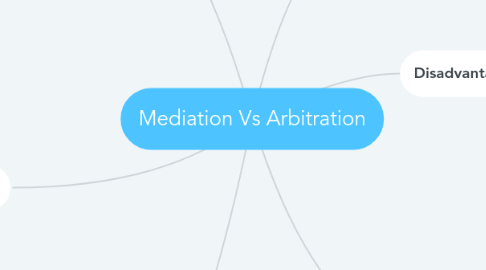Mediation Vs Arbitration
by mayra lupercio

1. Arbitration Advantages
1.1. Simplified procedures: An arbitration may get rid of huge amount of paperwork, subpoenas, depositions, multiple hearings, and comparable processes.a lot of those expensive and time-consuming tools of litigation.
1.2. Cost: Arbitration is a more cost-efficient method to solve disagreements.
1.3. Speed: Arbitrations have a a more specific and defined timeline towards settling a disagreement, and arbitrators do not always deal with heavy caseloads and work, which results in faster final verdicts.
2. Arbitration Disadvantages
2.1. No jury: When there's an arbitration there is no need for a jury. This leaves the matter in the hands of an arbitrator, who plays a dual part of the judge and the jury.
2.2. Fairness: Businesses that support arbitration might have a specific relationship with a few of the arbitrators, as well as well versed on the overall arbitration course of action.
2.3. Cost: Arbitration costs can get pricey. This is due to the fact that an arbitration can be dissimilar in complexity and can take on a lot of forms. In some instances, this may be more probable to increase the costs in opposed to litigation.
3. Arbitration Qualifications
3.1. Senior level business or professional experience with minimum of 10 years of legal practice
3.2. Professional certificate or Field of expertise or Educational degree
3.3. Arbitration and forms of dispute resolution or training or experience
3.4. Association in a professional association
3.5. Other relevant achievements or experience.
4. Advantages
4.1. Less Formal- Allows all parties involved to be more involved than they generally might be in a court-setting. (Findlaw, 2018).
4.2. Less Expensive- Obtaining a mediator is cheaper than hiring a lawyer
4.3. Greater Control and Flexibility- All parties involved in the lawsuit have power over it.
5. Disadvantages
5.1. Sometimes there is no resolution.
5.2. With mediation legal precedent cannot be set.
5.3. Mediation lacks the legal and procedural securities warranted by the federal and state courts. (Lawshelf, 2018).
6. Mediator Qualities
6.1. Patience and Tact: The Mediator must have patience and tact in creating and maintaining rapport between himself and the party, enhancing the success of the process.
6.2. Credibility: The Mediator must provide a clear, accurate, and professional product and an accurate assessment of his capabilities. He must be able to clearly articulate complex situations and concepts.
6.3. Adaptability: A Mediator must adapt to the many and varied personalities which he will encounter.
6.4. Perseverance: A tenacity of purpose can be the difference between a Mediator who is good and one who is advanced.
6.5. Appearance and Demeanor: The Mediator's personal appearance may greatly influence the conduct of any mediation and attitude of the party toward the Mediator.


